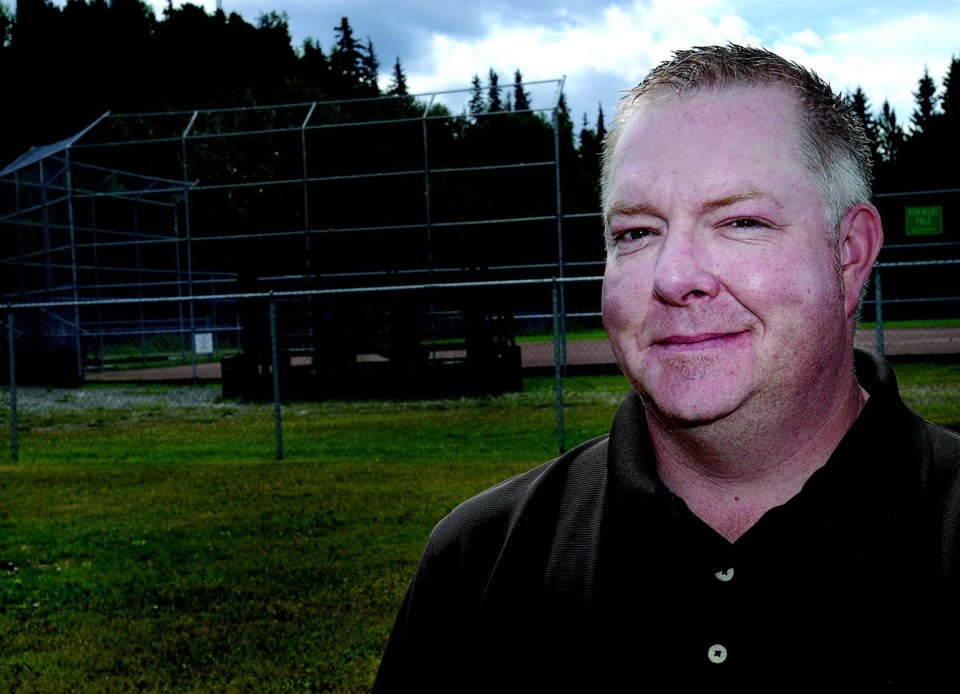Bill Ollinger has no kids of his own. Yet, for 17 years, he was a coach in the Spruce City Minor Boys Fastball Association.
He coached because he wanted to pass along his knowledge to youngsters eager to learn. He coached because of the look of joy he would see in their eyes when they got a hit, made a nice catch or scored a run.
When Ollinger's Cariboo-North East team finished play at the B.C. Summer Games last month in Surrey, he retired. Everybody around local ball diamonds expects him to be back next year to lead and instruct again.
But he's adamant.
He's done.
At least for now.
"You never know," said the 43-year-old Ollinger, a local real estate agent. "I have two younger nephews in Edmonton so they may decide to play ball or maybe move here one day, or maybe we move there. But as of right now, ball is officially over for me as a coach."
Ollinger first got involved in coaching in the early 1990s. For years, he had been a slo-pitch and fastball player and decided it was time to find a new focus. So, he volunteered to help Joe Lefebvre with his minor boys team.
"He was a good coach and he kind of spearheaded my getting into coaching full-time," Ollinger said. "I had never really coached before and I came on as an assistant."
After he had a couple seasons under his belt, Ollinger took a break from coaching but was pulled back into it when nephew Chris Spyker -- who was nine at the time -- decided he wanted to play. Ollinger simply couldn't stay away. In later years, he went on to coach nephews Cody Boulding and Austyn Boulding. The family ties were special for Ollinger but every kid he coached along the way became one of his own.
"Think about it," he said, emotion welling up in his voice. "I've coached kids who have kids. That's mind-blowing. I've sold a house to a kid that played for me. You coach so long and you don't forget them. And they don't forget you."
For Ollinger, the game was never about winning and losing.
"It's about developing kids to become responsible young men and learning how to overcome obstacles in life," he said. "We try to talk to our boys. We never yell at them, we never swear at them. We give them respect and we get it back."
While the road traveled was always more important than the destination, some of Ollinger's Prince George Timberwolves teams did reach great heights of success. In 2009, his club of 10- and 11-year-olds was the surprise champion at the squirt C provincials in Whalley. The team was the youngest in the tournament but used chemistry and momentum to advance to the final, where it beat the Richmond Rangers 20-8.
"We took some kids with fundamental skills that we could develop into solid ball players," Ollinger said. "They leaned on each other, and when you play with a better player you become better. So we had a handful of kids that could bring up these other players."
From provincial championship tournaments, Ollinger also has two silver medals and two bronze medals.
Ollinger's longtime involvement in minor sports comes as no surprise to those who know his family history. His grandfather, Fernie, spent decades building the sports of baseball and hockey in the city and was inducted into the Prince George Sports Hall of Fame in 2008.
Some of the other coaches Ollinger has worked with over the years are sister-in-law Tarissa Boulding, Dean Tarasoff, Bonnie Rentz and Blair Walkey. He and Walkey spent the past five seasons together.
"I'm sad to see him go," Walkey said. "He's a great guy to work with and puts the kids ahead of winning and losing."
Walkey's sons, Joel and Graham, both played for Ollinger.
"Bill has been a good role model to the boys as far as having a balance between playing fairly and trying your best to win, but not having that be your sole purpose," Walkey said.
With the extra hours Ollinger will have on his hands next spring and summer, he'll spend more time with wife Chari and enjoy the traditional pastimes of the warm-weather seasons.
"We'll do more camping and sightseeing and have family time," he said. "I don't know how much time I'll spend out at the ball field. I don't want to be that ex-coach in the stands, watching other coaches do their thing."


.png;w=120;h=80;mode=crop)
